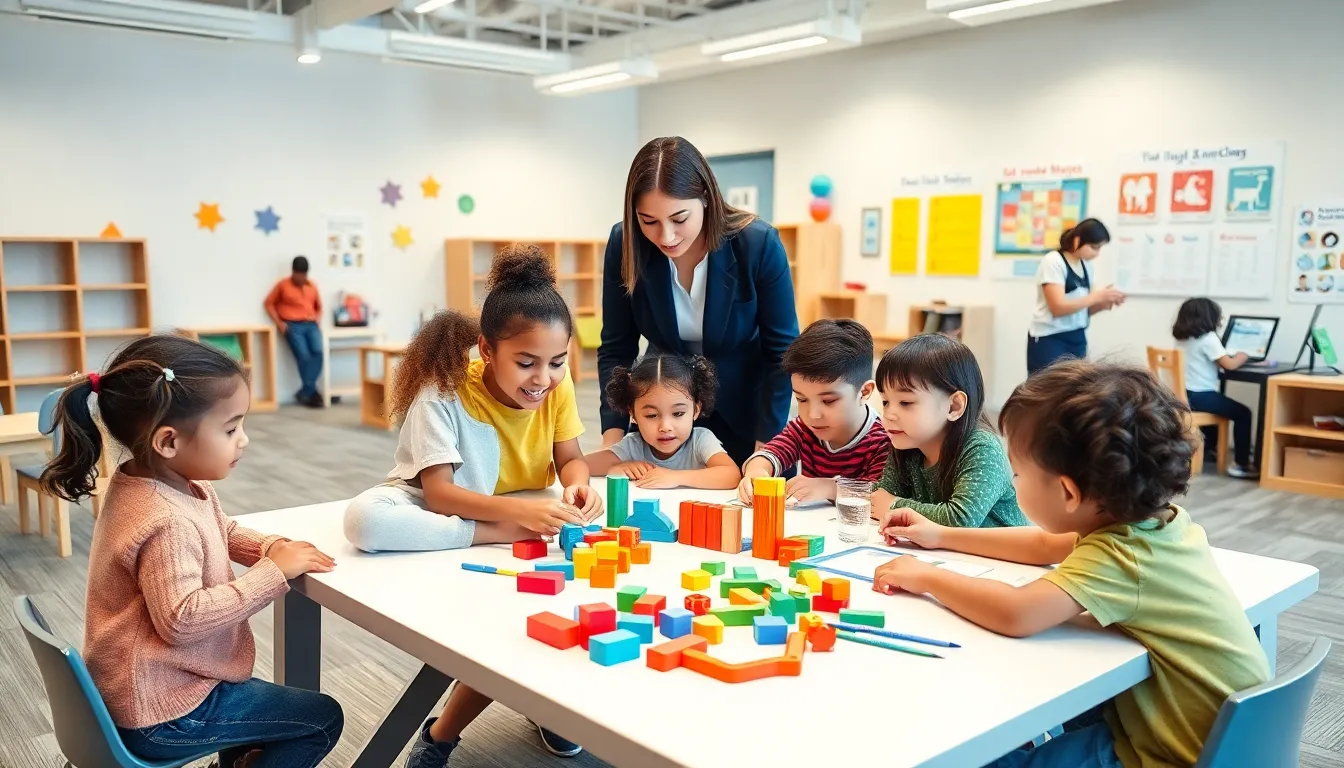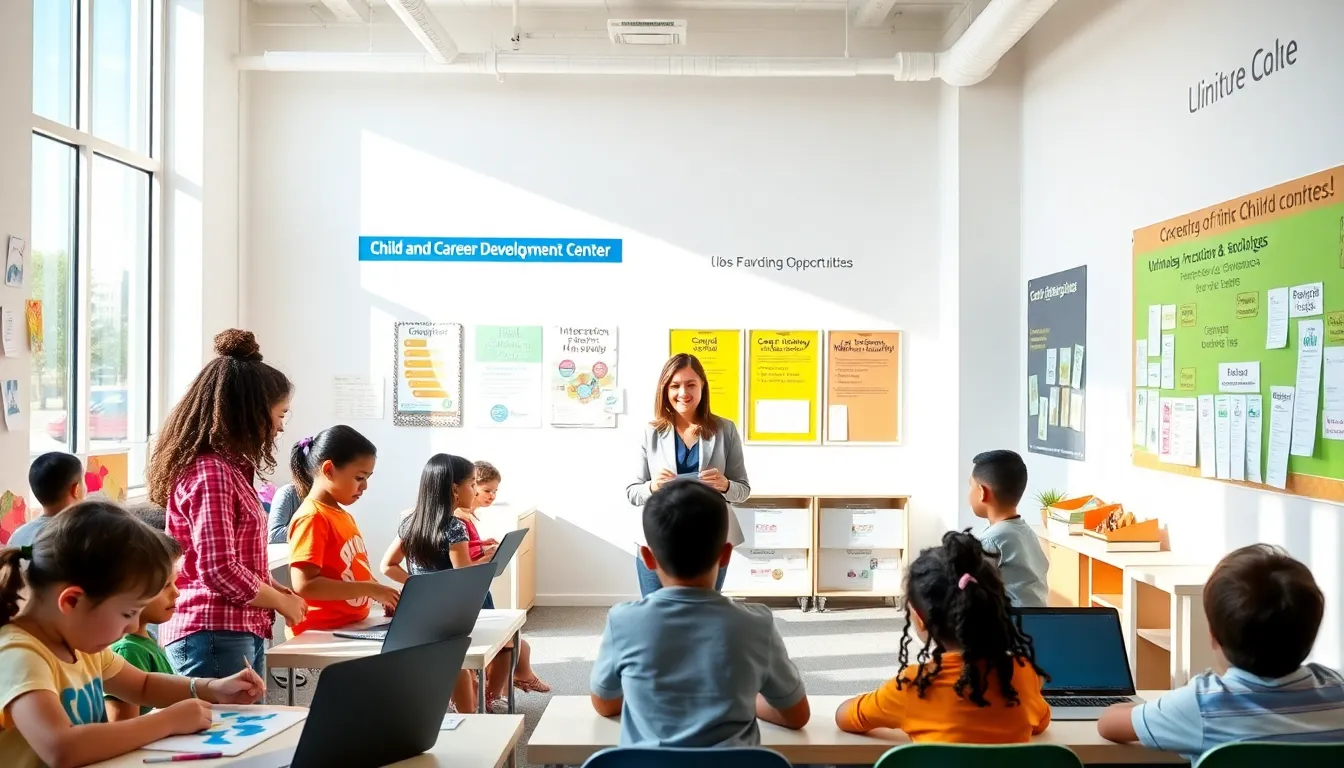Imagine a space where your child’s dreams take shape, and their potential is nurtured with care and expertise. Welcome to the Child and Career Development Center. Think of it as a magical garden where seeds of knowledge are sown, watered with guidance, and sunlighted by opportunities. Here, young minds not only learn but also grow, both in spirit and skill. Kids aren’t just preparing for school: they’re prepping for life. In this text, we unravel the importance of such centers, highlighting how they play a pivotal role in a child’s development while seamlessly transitioning into career readiness for young adults. So, buckle up. We’re diving deep into the future of our youth.
Table of Contents
ToggleUnderstanding Child Development

Child development is a fascinating journey, one that transforms tiny tots into capable young individuals. Understanding this process is crucial for parents, educators, and practitioners.
The Phases of Child Development
A child progresses through various phases, including infancy, early childhood, middle childhood, and adolescence. Each phase comes with unique characteristics and developmental tasks. Infants thrive on sensory exploration, while toddlers focus on mastering motor skills. As children enter school, they begin to develop language and cognitive abilities, setting the stage for more complex thinking. Knowing these stages helps adult caregivers tailor their approach to better support a child’s needs.
Key Milestones in Early Childhood
Milestones serve as road markers on this developmental journey. From saying their first words around 12 months to learning to ride a bike by age six, these achievements build confidence. Early learning experiences should highlight curiosity and exploration without overwhelming the young minds. Understanding these milestones allows parents to celebrate progress and seek support if a child lags in any area.
Importance of Social and Emotional Development
Social and emotional skills are equally vital. They impact a child’s behavior, interactions, and overall wellbeing. For instance, learning to share toys or resolve conflicts peer-to-peer takes practice. Establishing these foundations early on prepares children for both academic settings and life beyond the classroom. Investing time in fostering emotional intelligence is invaluable for their future relationships.
Career Development for Young Adults
As children grow, the focus begins to shift from education to career preparation. Here’s how they can transition smoothly from the classroom to the workplace.
The Transition from School to Career
The leap from school to a career can be daunting. It’s as if stepping off a diving board into unknown waters. Transition programs play a critical role by providing resources and support, guiding young adults through this change. By mentoring them on industry expectations, professional behavior, and networking, development centers can act as launch pads for burgeoning careers.
Skills Development and Career Readiness
Career readiness doesn’t just happen: it’s cultivated. Educational programs should integrate practical skill-building workshops to equip youth with the tools they need. For example, conflict resolution, teamwork, and effective communication are essential in any workplace. Incorporating internships or hands-on experiences helps bridge the gap between theoretical knowledge and practical application.
Career Counseling and Guidance Services
Expert advice from career counseling can steer young adults toward fulfilling career paths. Guidance services equipped with trained professionals can assess interests and strengths, offering personalized recommendations. Job shadowing, resume-building workshops, and interview skills training help prepare them before their first real-world leap.
Programs and Resources Offered by Development Centers
Development centers are treasure troves of programs and resources tailored to foster growth. They are designed to cater to the unique needs of children and young adults alike.
Educational Programs and Workshops
Workshops can range from art and music to STEM-focused classes. These programs ignite passion and creativity while developing critical thinking and problem-solving abilities. They foster a love for learning that extends beyond the classroom. Specialized sessions also include career exploration activities, enhancing young individuals’ exposure to various fields.
Partnerships with Local Businesses and Organizations
Forming partnerships with local businesses encourages real-world learning experiences. This symbiotic relationship provides young adults opportunities, such as internships and mentorships, while businesses gain enthusiastic learners. Collaboration bridges gaps between education and employment, ensuring what is taught aligns with industry demands. Such partnerships can create a pipeline of talent for local industries.
Creating a Supportive Environment for Families
A strong support system is vital for every child’s success. Development centers strive to foster a community atmosphere where families feel involved.
Engaging Parents and Guardians in the Process
Engaging parents not only builds trust but also enhances the child’s learning environment. Workshops designed for parents help them understand developmental milestones and learn how to support their child’s educational journey. Regular communication through newsletters, meetings, and events ensures that parents are kept in the loop, making them partners in their child’s development.
Building Community Support Networks
Community support networks play an essential role in complementing what development centers provide. When families connect with each other, they create a web of support that can share resources, advice, and encouragement. Community events, social gatherings, and information-sharing platforms help build strong relationships among families and center staff, further enriching the developmental journey.




